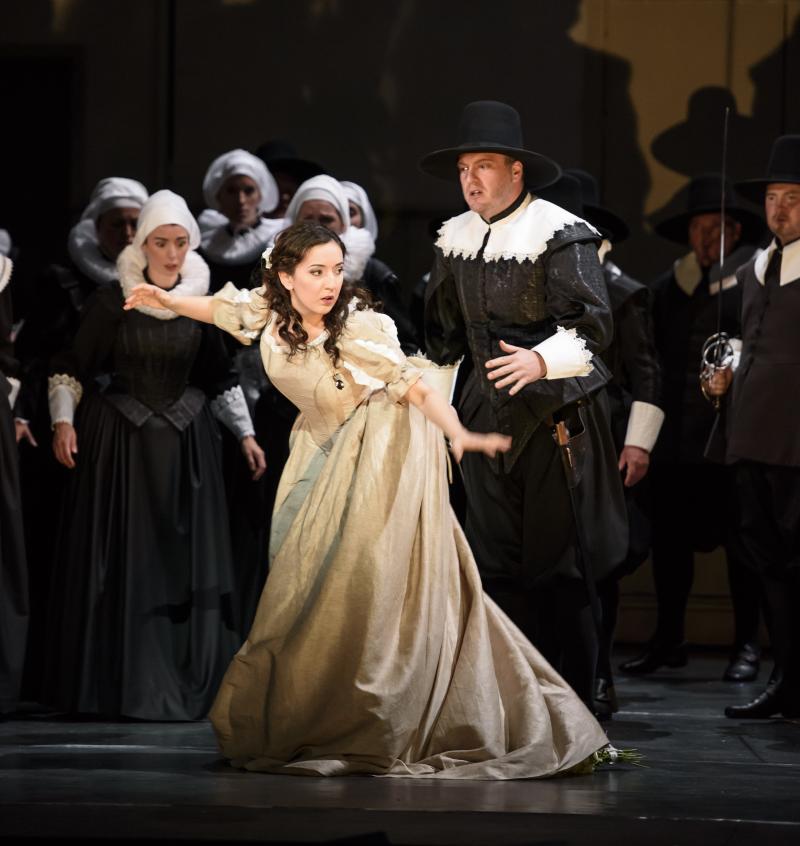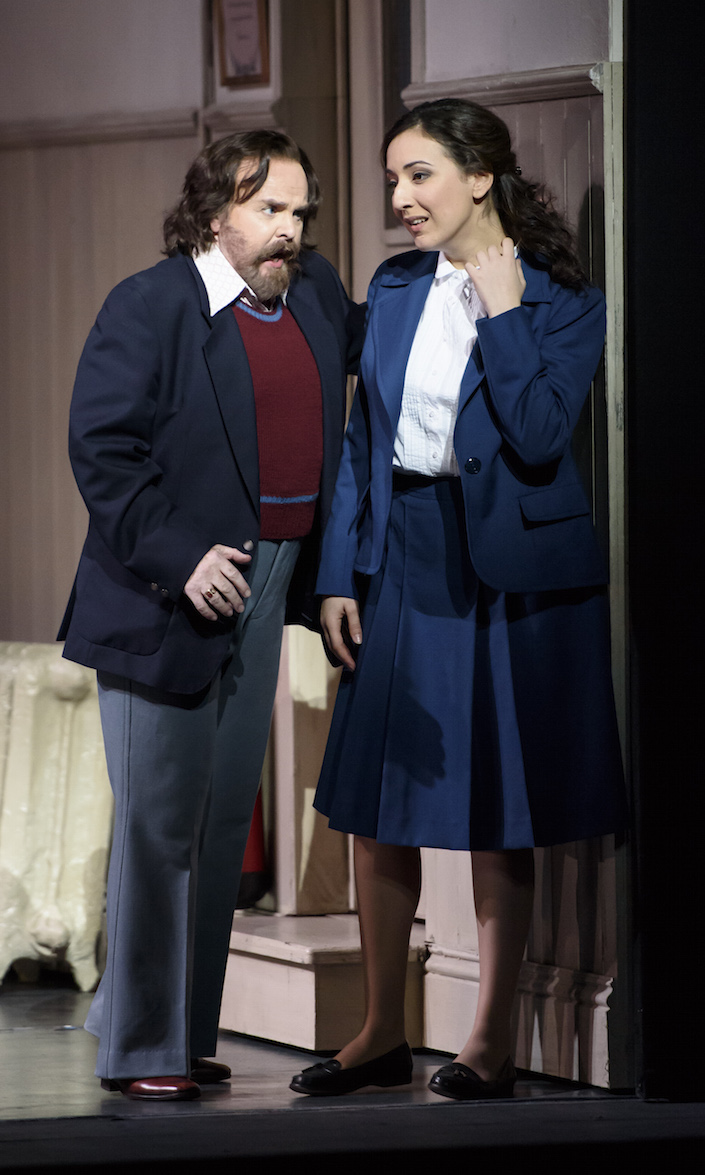I Puritani, Welsh National Opera | reviews, news & interviews
I Puritani, Welsh National Opera
I Puritani, Welsh National Opera
Bellini's last opera partly relocated but it's the singing and playing that count

Whatever one may feel about Bellini’s music, it’s hard to think of him as in any sense a political composer. So you could almost hear the hearts hit the floor when the curtain went up – or rather was as usual already up – on the opening of Bellini’s Puritani with Orangemen and a scruffy Catholic Arturo instead of good old Roundheads and Cavaliers.
To tell the truth, I’m still not sure what political point she is making here, or even whether she is making a political point at all. The most striking moment of the production, and by far its most memorable passage, is Arturo’s first official entrance as a Cavalier aristocrat (the scruffiness is part of the usual preludial dumb-crambo), and Elvira’s switch from blue twin set, vintage 1970, to a flowing dress of the civil war time. Here something subtle and intriguing takes place. The flowing dress has already appeared while the twin set was onstage and singing; but soon the flowing dress is singing while the twin set looks on. Double casting? No, but a doppelganger, cunningly staged and designed (by Leslie Travers): a figment of Elvira’s mental instability, an image of the dreams she harbours, and an echo, presumably, of her crazed complaint that her separation from Arturo has been, not three months, but “tre secoli,” three centuries.
 The idea of antique style observed and antique disasters relived is touching and momentarily vivid. It suits Bellini, whose treatment of subject-matter is stereotyped and stylised. But alas it doesn’t work for the drama in the long term. In the final act Miskimmon brings us back to Ulster with a bump and not knowing quite why. Elvira, once lovely in her portrait gown, is again drab and dumpy in office blue (pictured left with Barry Banks), her misery commonplace. And to cap it all, Bellini’s happy ending is transformed into a tragedy with Arturo murdered by the Orangemen who have just been instructed (admittedly by a Roundhead herald) to release him. This absurdity turns Bellini, whose music remains happy, into an ironist; and it also – a minor detail perhaps – involves a change in the final ensemble, with Arturo’s voice absent.
The idea of antique style observed and antique disasters relived is touching and momentarily vivid. It suits Bellini, whose treatment of subject-matter is stereotyped and stylised. But alas it doesn’t work for the drama in the long term. In the final act Miskimmon brings us back to Ulster with a bump and not knowing quite why. Elvira, once lovely in her portrait gown, is again drab and dumpy in office blue (pictured left with Barry Banks), her misery commonplace. And to cap it all, Bellini’s happy ending is transformed into a tragedy with Arturo murdered by the Orangemen who have just been instructed (admittedly by a Roundhead herald) to release him. This absurdity turns Bellini, whose music remains happy, into an ironist; and it also – a minor detail perhaps – involves a change in the final ensemble, with Arturo’s voice absent.
An interesting failure, then, but with a number of redemptive features. Chief among them is the Elvira of Rosa Feola, a marvellous singing actress, in full command of the part’s range and coloratura, and with poise and a fine sense of nineteenth-century visual idiom, that slightly exaggerated choreography of the body that we associate, rightly or wrongly, with the great romantic actors from Irving to Ellen Terry. Her mad scene, especially, is a masterclass in refined excess: in knowing, in Cocteau’s phrase, how far you can go too far. And, by the way, it’s exquisitely sung.
The support is good enough, sometimes better than that. Barry Banks is a fluent, eloquent Arturo, David Kempster a resonant if elderly-looking Riccardo, Wojtek Gierlach an exact, mildly self-important uncle Giorgio. Elena Thomas floats round effectively as Elvira’s double, cleverly half-lit (and Mark Jonathan’s haunting use of shadows deserves mention). Best of all, as so often here, is the chorus singing and orchestral playing under Carlo Rizzi. Never mind the voices; this is a score very finely wrought for orchestra, with particularly memorable writing for horns and high woodwind. No wonder Wagner and Chopin both loved Bellini. Amid all the rum-ti-tum there’s a lot to admire.
rating
Explore topics
Share this article
Add comment
The future of Arts Journalism
You can stop theartsdesk.com closing!
We urgently need financing to survive. Our fundraising drive has thus far raised £49,000 but we need to reach £100,000 or we will be forced to close. Please contribute here: https://gofund.me/c3f6033d
And if you can forward this information to anyone who might assist, we’d be grateful.

Subscribe to theartsdesk.com
Thank you for continuing to read our work on theartsdesk.com. For unlimited access to every article in its entirety, including our archive of more than 15,000 pieces, we're asking for £5 per month or £40 per year. We feel it's a very good deal, and hope you do too.
To take a subscription now simply click here.
And if you're looking for that extra gift for a friend or family member, why not treat them to a theartsdesk.com gift subscription?
more Opera
 Tosca, Welsh National Opera review - a great company reduced to brilliance
The old warhorse made special by the basics
Tosca, Welsh National Opera review - a great company reduced to brilliance
The old warhorse made special by the basics
 BBC Proms: The Marriage of Figaro, Glyndebourne Festival review - merriment and menace
Strong Proms transfer for a robust and affecting show
BBC Proms: The Marriage of Figaro, Glyndebourne Festival review - merriment and menace
Strong Proms transfer for a robust and affecting show
 BBC Proms: Suor Angelica, LSO, Pappano review - earthly passion, heavenly grief
A Sister to remember blesses Puccini's convent tragedy
BBC Proms: Suor Angelica, LSO, Pappano review - earthly passion, heavenly grief
A Sister to remember blesses Puccini's convent tragedy
 Orpheus and Eurydice, Opera Queensland/SCO, Edinburgh International Festival 2025 review - dazzling, but distracting
Eye-popping acrobatics don’t always assist in Gluck’s quest for operatic truth
Orpheus and Eurydice, Opera Queensland/SCO, Edinburgh International Festival 2025 review - dazzling, but distracting
Eye-popping acrobatics don’t always assist in Gluck’s quest for operatic truth
 MARS, Irish National Opera review - silly space oddity with fun stretches
Cast, orchestra and production give Jennifer Walshe’s bold collage their all
MARS, Irish National Opera review - silly space oddity with fun stretches
Cast, orchestra and production give Jennifer Walshe’s bold collage their all
 Káťa Kabanová, Glyndebourne review - emotional concentration in a salle modulable
Janáček superbly done through or in spite of the symbolism
Káťa Kabanová, Glyndebourne review - emotional concentration in a salle modulable
Janáček superbly done through or in spite of the symbolism
 Buxton International Festival 2025 review - a lavish offering of smaller-scale work
Allison Cook stands out in a fascinating integrated double bill of Bernstein and Poulenc
Buxton International Festival 2025 review - a lavish offering of smaller-scale work
Allison Cook stands out in a fascinating integrated double bill of Bernstein and Poulenc
 Tosca, Clonter Opera review - beauty and integrity in miniature
Happy surprises and a convincing interpretation of Puccini for today
Tosca, Clonter Opera review - beauty and integrity in miniature
Happy surprises and a convincing interpretation of Puccini for today
 Hamlet, Buxton International Festival review - how to re-imagine re-imagined Shakespeare
Music comes first in very 19th century, very Romantic, very French operatic creation
Hamlet, Buxton International Festival review - how to re-imagine re-imagined Shakespeare
Music comes first in very 19th century, very Romantic, very French operatic creation
 Falstaff, Glyndebourne review - knockabout and nostalgia in postwar Windsor
A fat knight to remember, and snappy stagecraft, overcome some tedious waits
Falstaff, Glyndebourne review - knockabout and nostalgia in postwar Windsor
A fat knight to remember, and snappy stagecraft, overcome some tedious waits
 Salome, LSO, Pappano, Barbican review - a partnership in a million
Asmik Grigorian is vocal perfection in league with a great conductor and orchestra
Salome, LSO, Pappano, Barbican review - a partnership in a million
Asmik Grigorian is vocal perfection in league with a great conductor and orchestra
 Semele, Royal Opera review - unholy smoke
Style comes and goes in a justifiably dark treatment of Handelian myth
Semele, Royal Opera review - unholy smoke
Style comes and goes in a justifiably dark treatment of Handelian myth

Comments
A glorious first night for